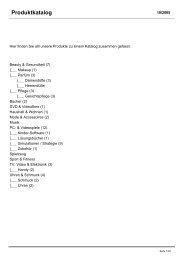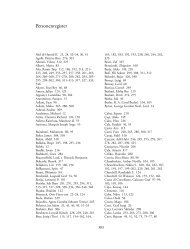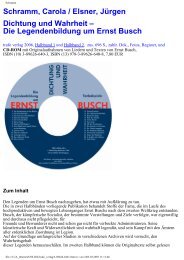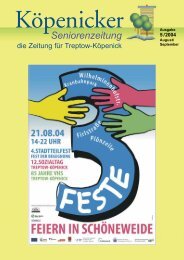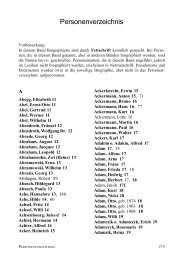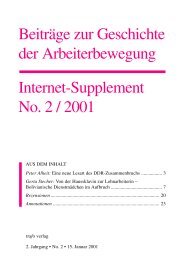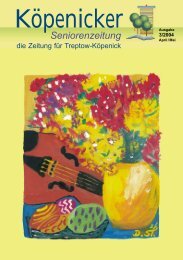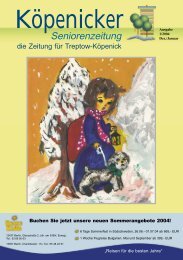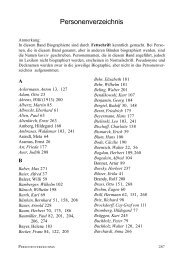Beiträge zur Geschichte der Arbeiterbewegung Internet-Supplement ...
Beiträge zur Geschichte der Arbeiterbewegung Internet-Supplement ...
Beiträge zur Geschichte der Arbeiterbewegung Internet-Supplement ...
You also want an ePaper? Increase the reach of your titles
YUMPU automatically turns print PDFs into web optimized ePapers that Google loves.
Richard Croucher<br />
BzG-<strong>Supplement</strong> No. 1/2000 15<br />
1996, pp.24670 and p.268. Dartmann contends that ‘The TUC did not institutionalise any links with<br />
the German unions apart from fraternal attendance at Congresses, invitations to the newly emergent<br />
international bodies or the Trade Union Marshall Plan conference, or individual relief actions...’ (p.246)<br />
Having somewhat un<strong>der</strong>mined his initial assertion by providing evidence of links, Dartmann dealt with<br />
the appointment of Gottfurcht as liaison officer by saying that it was ‘the only concrete attempt.....the<br />
effectiveness of which was doomed to be very limited from the start, though’ but without explaining<br />
why he consi<strong>der</strong>ed it so ‘doomed’. (p.246) Dartmann’s view of Gottfurcht’s work differs from that taken<br />
by Boeckler (see note 8 below) and Tewson (see note 19 below). Dartmann also argued that those<br />
parts of the Allied Control Commission for Germany concerned with economic matters were more<br />
creative in developing codetermination than Manpower Division. (p.268).<br />
7 Law 22 is examined in P.Weiler, British Labour and the Cold War, Stanford University Press, Stanford:<br />
1988, p. 167.<br />
8 Tewson to Gottfurcht, 4 June, 1947. MRC: 292/943/12. All documents referred to are from the TUC’s<br />
archive deposited in the Mo<strong>der</strong>n Records Centre, University of Warwick and are prefixed ‘MRC’. In September<br />
1947, Tewson and Boeckler had a long conversation when the latter visited the TUC Congress<br />
in Southport, during which the latter expressed ‘consi<strong>der</strong>able satisfaction’ with Gottfurcht’s liaison work<br />
between the two movements. [Tewson to Bell, 18 September, 1947. MRC: 292/943/12]<br />
9 Gottfurcht’s Report on Germany, May, 1949. MRC: 292/943/118.<br />
10 514/PC/10: ‘Law No.22-Works Council’, 28 February, 1947. MRC: 292/943/12. Property Control<br />
remained in control of many important enterprises as late as 1951. (Public Record Office [PRO]: FO<br />
1023/342)<br />
11 Kenny to Carthy, 20 May, 1947. MRC: 292/943/12.<br />
12 IR Branch Monthly Bulletin, 47/2. PRO: FO 1051/433.<br />
13 Luce to Gottfurcht, 26 June, 1947. MRC: 292/943/12.<br />
14 The speech had explained that British policy had been to obtain a sound growth from below, and that<br />
although this had resulted in a large number of small unions, Luce would not intervene to prevent larger<br />
bodies being formed. He encouraged the creation of a co-ordinating body. ‘Speech made by Mr. R.W.<br />
Luce to the Trade Union Zonal Council at Bielefeld on 4 October, 1946’. MRC: 292/943/12.<br />
15 Gottfurcht to Luce, 7 July, 1947. MRC: 292/943/12.<br />
16 Gottfurcht’s Report of May 1949. MRC:292/943/118.<br />
17 Gottfurcht thanked Ernest Bell and Albert Carthy of the TUC’s International Department, as well as<br />
Tewson and Walter Citrine, General Secretary and ex-General Secretary of the TUC respectively, in a<br />
letter informing them that he had been successful in his application for British nationality: ‘To express<br />
my gratitude to all of you is my deep-felt desire at this juncture’. Gottfurcht to Bell, 11 February, 1948.<br />
MRC: 292/943/12.<br />
18 M. Schnei<strong>der</strong>, op.cit., p.259.<br />
19 R. Steininger, op.cit., pp. 69-90.<br />
Steininger’s view that ‘die Briten’ of the TUC and Foreign Office need hardly be differentiated between<br />
has been challenged by evidence produced by Weiler, who shows that the Foreign Office complained<br />
in late 1947 that the TUC was giving insufficient active support to the Foreign Office in its attempts to<br />
combat both Communist and American Fe<strong>der</strong>ation of Labour influence in Germany.(P. Weiler, op.cit.,<br />
p.178). D. McShane, op.cit., p.226.<br />
20 D. McShane, op.cit., p.219.<br />
21 Gottfurcht’s report of May 1949. MRC: 292/943/118.<br />
22 Tewson to Rosenberg, 18 March, 1950. MRC: 292/943/17. Gottfurcht was succeeded as liaison officer<br />
by his old colleague Richard Broh, who held the position for much of the 1950s.<br />
23 Gottfurcht to Boeckler, 27 January, 1950. MRC: 292/943/12.<br />
24 Sir Thomas Hutton to Sir Vincent Tewson, 13 March, 1953. MRC: 242/943/18. The German employers’<br />
attitudes on this occasion seem to support Gottfurcht’s view of them as fundamentally hostile to cooperation<br />
with trade unions.<br />
25 Tewson to Hutton, 14 March, 1952. MRC: 242/943/18.<br />
ends



